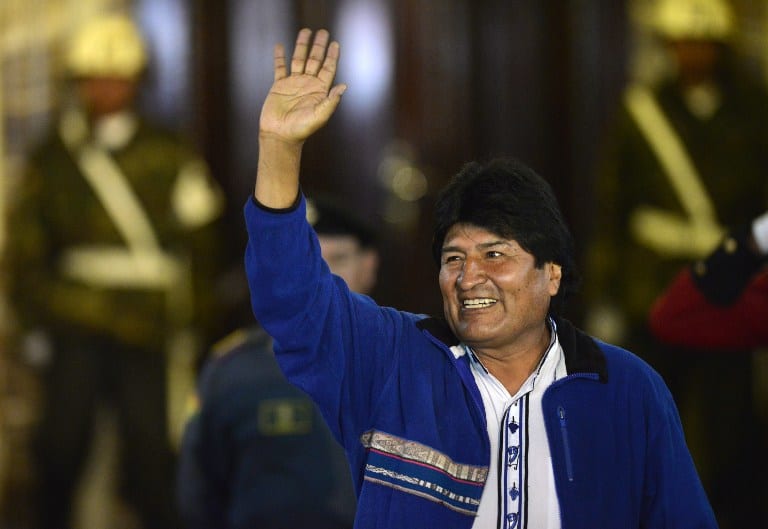LA PAZ — Bolivian President Evo Morales won a third term Sunday with more than 60 percent of the vote, exit polls found, giving him a strong mandate to expand his leftist reforms.
Morales, the country’s first indigenous president, finished about 40 points ahead of his nearest rival, wealthy cement magnate Samuel Doria Medina, found pollsters Ipsos and Equipos Mori.
Thousands of Bolivians poured into the streets of La Paz in celebration after the exit polls were released, flocking to the presidential palace for Morales’ victory speech.
“This is the triumph of the anti-colonialists and anti-imperialists,” said Morales, who has had aligned himself with Cuba, Venezuela and Iran and has an antagonistic relationship with the United States.
RECOMMENDED: Bolivia’s Morales: The US abolished Costa Rica’s army
He dedicated his win to Cuban leader Fidel Castro, late Venezuelan president Hugo Chavez and all “anti-imperialist and anti-capitalist” leaders.
Morales, who rose to prominence as a union leader fighting for the rights of the country’s coca growers, has brought sweeping changes since taking office in 2006.
His government has nationalized a broad range of sectors, including oil, gas, mining, telecommunications and water; rolled out welfare grants for the elderly, children and expectant mothers; and moved to empower previously marginalized groups, among them the indigenous people who account for 65 percent of the population.
Defying opponents’ dire warnings of economic catastrophe, Bolivia, one of the poorest countries in Latin America, has instead seen a boom.
The economy grew 6.8 percent last year and is forecast to grow more than five percent this year, one of the fastest rates in the region.
The exit polls found “El Evo,” as he is known in Bolivia, had won in all but one of the country’s nine departments, even taking the eastern business hub of Santa Cruz, once a bastion of opposition to his government.
Morales’ Movement Toward Socialism (MAS) was meanwhile on track to win 111 out of 130 seats in the Chamber of Deputies and 25 of the 36 seats up for grabs in the Senate, according to the exit polls.
Partial official results with about 70 percent of all ballots counted were expected to be released around midnight.
If his win is confirmed, Morales, 54, will extend his time in office to 14 years, until January 2020, after Bolivia’s Supreme Court ruled last year that his first term was exempt from a new constitution adopted in 2009 that imposed a limit of one re-election for sitting presidents.
Lopsided campaign
Political analyst Reymi Ferreira of Gabriel Rene Moreno University in Santa Cruz called Morales’s landslide “a recognition of the government’s management and of the fact the opposition never presented a vision for the country.”
Santa Cruz student Sonia Tika summed up the president’s popularity.
“I voted for Evo because he’s done good things — built roads, given us computers, food stamps. Everything the people asks for, he gives,” she said.
Posters bearing the slogan “With Evo, we’re doing well” blanketed La Paz on Election Day, far out-shining the opposition’s propaganda, which was conspicuously absent.
Doria, 55, complained after voting in La Paz that international observers with the Organization of American States had been praising the elections even before polls closed. “That’s not normal,” he said.
Álvaro Colom, the former Guatemalan president who heads the OAS delegation, said the observers were impartial.
Some six million people were registered to cast ballots in the presidential and congressional polls in Bolivia, where voting is compulsory.
Welcome stability
The economic and political stability Morales has presided over are welcome in Bolivia, which has suffered numerous coups since independence in 1825 and still struggles with deep poverty despite the recent boom.
Morales, a member of the Aymara ethnic group who grew up in an impoverished family and never finished school, has also used nationalist, anti-capitalist rhetoric to fire up popular support.
He has argued vociferously against the U.S.-led campaign targeting coca farming, which Washington brands a drug-trafficking activity because of the leaf’s use in cocaine.
Many Bolivians chew coca leaves or brew them as a tea. Morales has argued it is part of the country’s cultural heritage.
In 2008, he kicked the U.S. Drug Enforcement Agency out of the country, along with the U.S. ambassador, accusing them of conspiring against his government.
Critics accuse Morales of clinging to power and failing to rein in crime, drug trafficking and corruption.






